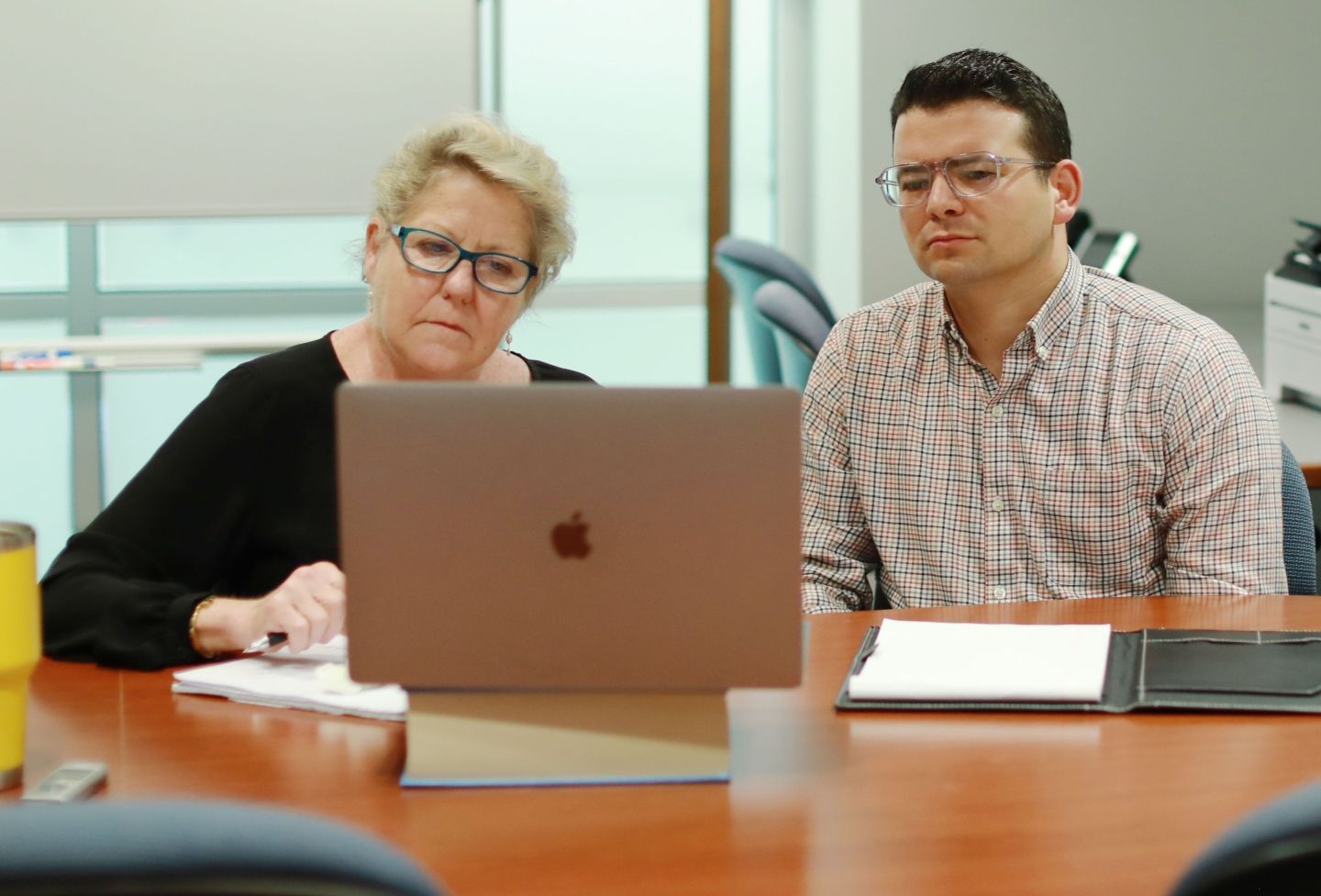Federal Appeals Court Hears Oral Arguments

A panel of judges from the U.S. Court of Appeals for the Federal Circuit lobbed quips and tough questions at attorneys arguing four cases at the Law School Oct. 2, in what was the court's first hearing in Virginia. Chief Judge Paul Michel, a 1966 graduate of the Law School, presided, along with Senior Judge S. Jay Plager and Judge Randall R. Rader, who has taught at the Law School.
The panel heard cases on patents involving adidas athletic shoes and motion sensors, on a pet treat trademark, and on whether a former federal firefighter qualified for certain retirement benefits. The Federal Circuit is unique among the 13 Circuit Courts of Appeals because of its special jurisdiction in cases involving international trade, government contracts, patents, trademarks, certain money claims against the U.S. government, federal personnel, and veterans' benefits. Michel said the court, established in 1982 by the merger of the U.S. Court of Customs and Patent Appeals and the appellate division of the U.S. Court of Claims, hears cases away from its home base of Washington, D.C., once a year.
In Akeva LLC v. adidas-Salomon AG and adidas America, Inc., Akeva attorney Dirk Thomas argued that his client's patented technology was used in shoe technology employed by adidas. "This is a very good case today because half the audience no doubt is probably wearing athletic shoes," joked Plager.
The case offered students an inside look at the kinds of technical minutiae debated in patent cases, which often involve making fine distinctions among similar technologies.
The adidas shoe heel in question was not detachable, and the "inventor [appellant] criticized the prior art for having detached use," adidas attorney Doug Kline offered in defense of his client. "We believe the claim's language covers a rotatable heel," argued Thomas-and that description is not limited to detachable heels.
The panel's second case, In Re Pet Food Centers, LLC, was appealed from the U.S. Patent and Trademark Office's Trademark Trial and Appeal Board decision. Attorney Tim Pecsenye argued that the board rejected Pet Food Center's trademark application for the name "Play Things" based on spurious Internet evidence. Pet Food Center's products include the Dingo Goof Ball, an edible rawhide ball wrapped around a chicken jerky treat.
"What's the harm in letting them have this Play Things label?" Plager quizzed associate solicitor William Jenks. "The harm is, we're removing from the lexicon words that can be used to describe products," Jenks replied. Pet Food Centers may re-apply for the trademark with new standing if the Play Things label becomes distinctive in the marketplace, he added.
In the third case, DESA IP v. EML Technologies, LLC and Costco Wholesale Corporation, DESA IP appealed a decision favoring EML Technologies, which created an outdoor light the appellant said infringed on its motion-sensor technology. Costco distributed EML's light.
The judges were troubled by the district court's reliance on the appellee's expert. "[The expert] seems to have made up a whole new nomenclature," Michel said, and the judge seemed to accept it. "What's really at issue in this case is whether they've succeeded in designing around your patent," Plager told DESA counsel James Higgins Jr.
At stake in Thor Weatherby, III, v. Department of the Interior was whether Weatherby, an Interior Department employee who previously served as an electronic mechanic for an Alaskan firefighting team, qualified for the federal government's Civil Service Retirement System, which was phased out in 1987. To qualify under the old system, Weatherby needed three years of service as a firefighter prior to 1987. The Interior Department questioned whether several months of his service qualified as the kind of work that the system was designed to reward.
Weatherby's job involved rigorous activity, if not the direct threat of fire, Michel pointedly told the government's attorney; he climbed mountains to set up communications equipment, for example. Weatherby's counsel, Craig James, noted his client was involved in 11 fires during the seven-month period in question, "many of which went days."
Akeva LLC v. Adidas-Salomon AG and Adidas America, Inc.
Appellant's Brief | Appellee's Brief | Reply Brief | Joint Appendix
In Re Pet Food Centers, LLC
Appellant's Brief | Appellee's Brief | Reply Brief | Joint Appendix
DESA IP v. EML Technologies, LLC and Costco Wholesale Corporation
Appellant's Brief | Appellee's Brief | Reply Brief | Joint Appendix I, II, III, IV
Thor Weatherby, III, v. Department of the Interior
Petitioner's Brief | Respondent's Brief | Reply Brief | Joint Appendix
Founded in 1819, the University of Virginia School of Law is the second-oldest continuously operating law school in the nation. Consistently ranked among the top law schools, Virginia is a world-renowned training ground for distinguished lawyers and public servants, instilling in them a commitment to leadership, integrity and community service.


